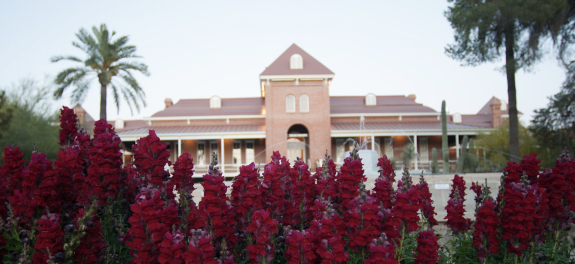
Welcome to the NSCS Program
The Undergraduate Program in Neuroscience and Cognitive Science (NSCS) is offered by the School of Mind, Brain and Behavior in the UA College of Science. Within the School, the Departments of Psychology and Speech, Language and Hearing Sciences also offer their own undergraduate programs.
The NSCS Program was established in May of 2010 with just 15 students admitted to our full major during the first admission period. Going into the 2023 - 2024 academic year, we now have over 600 active students in our program.
Read more about ... the School of Mind, Brain and Behavior
Read more about ... the Department of Neuroscience
Read more about ... the Department of Psychology
Read more about ... the Department of Speech, Language and Hearing Sciences
Read more about ... the Cognitive Science Program
Read more about ... the Neuroscience Graduate Interdisciplinary Program
Background
Neuroscience is the scientific study of the nervous system, which developed as a branch of biology but quickly became an interdisciplinary science that includes disciplines such as psychology, computer science, statistics, physics, philosophy, and medicine. As a result, the scope of neuroscience has broadened to include different approaches used to study the molecular, developmental, structural, functional, evolutionary, computational, and medical aspects of the nervous system.
Cognitive Science is the interdisciplinary study of how information is represented and transformed in the human brain. It consists of multiple research disciplines, including psychology, artificial intelligence, philosophy, neuroscience, learning sciences, linguistics, anthropology, sociology, and education. It spans many levels of analysis, from low-level learning and decision mechanisms to high-level logic and planning; from neural circuitry to modular brain organization.
Recent technological advances are moving these areas even closer together. The pairing of Neuroscience and Cognitive Science into a single major reflects this, and while a number of universities and colleges offer majors in either Neuroscience or Cognitive Science, we are unique in offering a program that combines the two.
Description of the Major
The program is designed on a strong foundation in the basic sciences, in psychology and philosophy, and in mathematics. This foundation is followed by a substantial set of core courses that expose students to the breadth of concepts and methods of scientific inquiry in the highly interdisciplinary fields of Neuroscience and Cognitive Science. In addition, students choose their electives in the major from emphasis areas that enhance their understanding of core concepts and that allow them to delve into specific sub-areas in accord with their personal interest.
The NSCS core courses will teach students:
- The general organization of the brain and its relation to the physiological and cognitive processes.
- The molecular and cellular mechanisms underlying neural excitability and synaptic physiology.
- The principles of sensory processing across modalities.
- The state of understanding of the biological bases of behavior.
- The basic principles of and circuitry involved in attention, language, emotion, and consciousness.
- The known molecular, cellular, and cognitive bases of learning and memory.
- The major theories about the evolution of brain and behavior, and discuss the interaction of heredity and environment.
- The basic steps in establishing the wiring plan of the nervous system, including common molecular signaling pathways.
- The genetic, molecular and cellular bases of common diseases and disorders of the nervous system.
What can you do with a degree in NSCS?
The major comprises a rigorous program of coursework that prepares students to enter graduate or professional school in one of several disciplines, to be competitive for entry-level positions in the pharmaceutical and health care industries and in industries using medically or biologically related technologies, to be a high school or middle school science teacher, or to enter other disciplines that increasingly interact with the Science, Technology Engineering and Math (STEM) disciplines, such as law and government policy-making.
Examples of opportunities include:
- Advanced education – graduate or professional degrees in neuroscience or cognitive science, medicine, psychology, nursing, bioengineering, speech and hearing, pharmacology, veterinary science, etc.
- Health-care related jobs – technical support in neural imaging, diagnostics; patient care or patient services for people with neurological disorders and injuries and their families; federal, state and local public health organizations as health analysts, case managers, program managers, intelligence analysts
- Teachers – all levels
- Policy-development jobs – federal and state government jobs researching issues related to neurological disorders and injuries and developing the basis for public policy
- Technical support jobs – biotechnology and pharmaceutical company laboratory assistants, technical support, marketing and sales; university laboratory research assistants; medical diagnostic laboratory assistants; medical, educational and recreational software and video production; robotics developer; information processing; artificial intelligence; telecommunications
- Non-profit and research development jobs - Private foundations and associations focused on neural disorders and injuries (e.g., Brain Injury Association, National Alliance on Mental Illness, Parkinson’s Disease Foundation) – policy analysts, program managers, research directors
For more information on useful careers with a Neurobiology degree, see the article What Can I Do With a Degree in Neurobiology (Harvard) in the Forms Archive.

